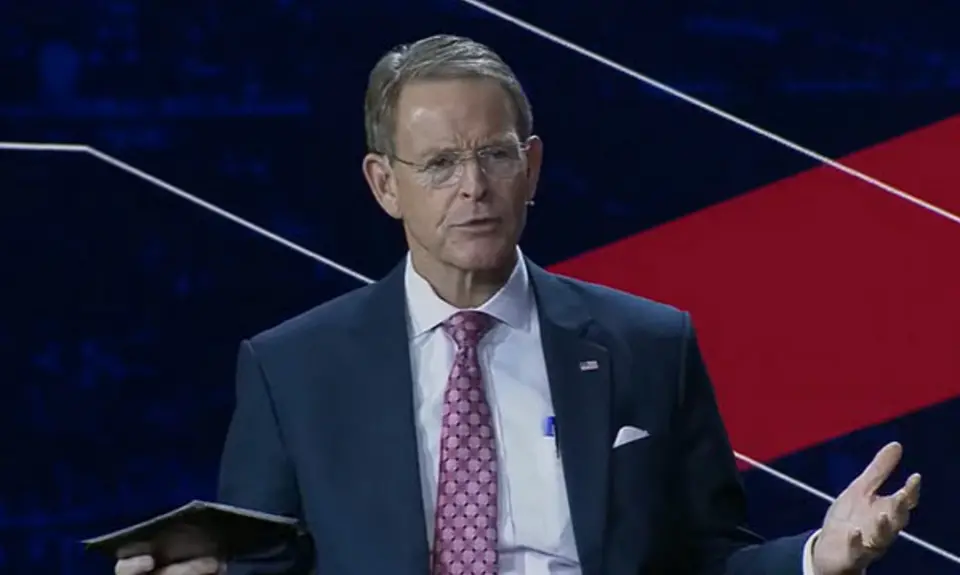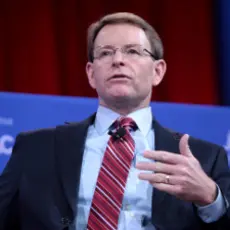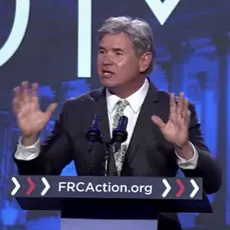Just weeks before what religious-right figures have insisted is the most important election in our lifetimes, if not the nation’s history, Donald Trump and a parade of Republican leaders could normally have been expected to show up at the Pray Vote Stand activist conference—formerly known as the Values Voter Summit—to revel in the adoration of the Family Research Council faithful and fire up the activists for the work ahead.
But not this year. While the conference opened last Friday with a prayer asking God to raise up Christians to vote and “take dominion over this earth exactly the way you intended it,” the triumphalist spirit was in short supply at a diminished and relatively downbeat conference.
Family Research Council leaders had a problem.
On the one hand, religious-right groups are spending tens of millions of dollars to elect Trump in hopes of getting four years of Christian nationalist policymaking and hundreds of MAGA-minded judicial nominees who could serve for decades.
On the other hand, Trump has very publicly disavowed two of the movement’s top priorities: criminalizing abortion nationwide and abolishing marriage equality. Banning abortion especially has been a top priority of religious-right leaders, who fought for years to enshrine hardline anti-abortion language in the Republican Party platform and make it virtually impossible for a Republican officeholder at the national level to take a pro-choice position.
Trump has swept that all aside, and Sen. J.D. Vance has publicly abandoned his own anti-choice position to align himself with Trump. Just days before Pray Vote Stand, Trump said he would veto a national abortion ban, reiterating his current position that restrictions on abortion should be decided by states and voters. And he supported his wife Melania publicly staking out her own pro-choice stance.
How could the Family Research Council enthusiastically promote Trump when he has repeatedly flipped them the bird on the issue they have declared for so long to be non-negotiable? The Nation’s Amy Littlefield effectively captured this conundrum in her story about Pray Vote Stand.
In a Friday session labeled Principles vs. Practicals, Perkins talked with Robert George, a leading intellect of the anti-choice and anti-LGBTQ movements. George had urged the Supreme Court to go beyond overturning Roe, and to require all states to treat abortion as homicide. Perkins didn’t sugarcoat the situation, asking George to talk about the fact that “what moderates and liberals couldn't do in 40 years was done overnight, and actually within just a couple of hours this year in the Republican Party," a reference to the Trump team's re-write of the GOP platform. George called it “tragic” and “disgraceful.”
When Perkins asked, “How did we get here?” George responded, “I think we allowed people to believe that they could have our vote without earning our vote.” Unspoken was the way religious-right leaders so thoroughly and enthusiastically embraced Trump despite his cruelty and constant lying.
Even now, they aren’t willing to turn their backs on him. After all, Trump’s first-term record and the Project 2025 agenda make it clear that a new Trump administration could do much to restrict access to abortion without Congress legislating a national ban. And Trump’s judges are doing what religious-right activists hoped they would, not only overturning Roe v. Wade, but further dismantling church-state separation and weakening federal agencies’ ability to regulate corporations and protect workers, consumers, and the environment. Hundreds of new MAGA judges could solidify right-wing dominance of the federal courts for years.
Pray Vote Stand keynote speaker Jack Hibbs, a California pastor and political activist, said there is “no doubt” that he will vote for Trump, even though he is “not happy about it.” Hibbs told a story about a phone call he had with Trump after the former president was shot in an assassination attempt. He urged Trump to publicly go to his knees and declare that Jesus Christ is Lord. That didn’t happen, Hibbs said; instead, Trump has been “wavering in his convictions,” which Hibbs said “has grieved my heart.”
It's possible that Hibbs’ lack of excitement about backing Trump this year is shared by more than a few rank-and-file religious conservatives. As Right Wing Watch reported this week, evangelical pollster George Barna is sounding the alarm that conservative evangelicals—the most important and loyal part of Trump’s base in 2016 and 2020—may not be as enthusiastic about voting this year.
How did we get here? In large part, it’s the story about how the movement’s greatest victory became a surprising political liability.
For decades, the holy grail of the religious-right political movement has been overturning Roe v. Wade and opening the door to state and federal laws banning abortion. With a big boost from Trump’s three Supreme Court justices, they achieved that goal in 2022.
But in ways that anti-abortion leaders did not seem to anticipate, the Supreme Court’s overturning of Roe exposed just how unpopular abortion bans really are. While a strong majority of Americans think abortion should be legal in most or all circumstances, Republican legislators in red states rushed to impose draconian bans. Since then, every time the issue has been put before the people, voters have protected access to abortion.
Trump and his strategists realized they were in a bind of their own.
Trump had repeatedly bragged about delivering on his promise to give Christian nationalists the Supreme Court of their dreams. He had taken credit for overturning Roe—although with transparently ridiculous lies that “everyone” on the right and left had wanted that outcome. He knows that he needs a strong turnout from conservative Christians, his most enthusiastic supporters, to get back in power.
On the other hand, it quickly became clear that the unpopularity of abortion bans could hurt Trump’s prospects by mobilizing pro-choice voters.
So Trump and his lackeys at the Republican National Committee tried to take make abortion a non-issue in the presidential campaign by gutting the Republican platform’s explicit call for an abortion ban, along with the assertion that marriage can only be between a man and a woman.
In a sign of the kind of authoritarian governance Americans could face if Trump wins office, his team tried to stack the platform committee with loyalists, then ruthlessly cut elected members of the committee out of the drafting process, shut down debate, intimidated dissenters, and forced the Trump team’s desired platform down the committee’s throats.
Perkins, a member of the platform committee, was outraged both by the watered-down language of the new platform and by the utterly undemocratic way Trump and the RNC forced it on people who have dedicated so much of their lives to creating and supporting an anti-choice Republican Party. Perkins was outspoken, denouncing the process as “despicable” and attacking committee chair Sen. Marsha Blackburn for her “shocking” and “unbelievable” support for the Trump team’s actions.
The absence of Trump and Vance and the relative scarcity of high-level Republican elected officials at Pray Vote Stand suggests that Perkins’ public criticism of the platform process may have burned some bridges between FRC and Trumpworld. It could also reflect the fact that the energy in the religious right has shifted from FRC to groups like Turning Point USA and dominionist networks whose influence soared during the Trump era.
FRC isn’t completely in the political wilderness. Sen. Josh Hawley showed up to insist that opposition to abortion must remain "fundamental" to the conservative movement. Three activist state attorneys general attended PVS, along with Oklahoma’s aggressively Christian nationalist Superintendent of Public Instruction Ryan Walters. And House Speaker Mike Johnson Zoomed in from the road to record a segment for Perkins’ radio show and podcast.







